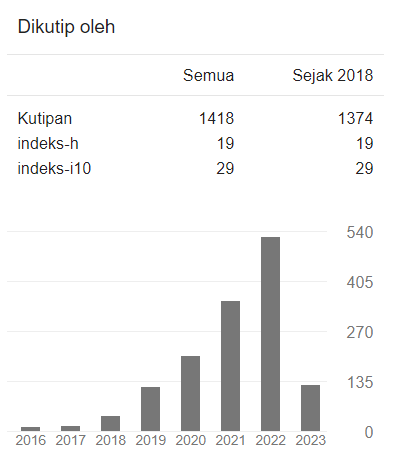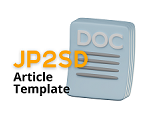Impact Of Massive Open Online Course (Mooc) As Best Practice In Indonesia Medan Marelan District Elementary School
DOI:
https://doi.org/10.22219/jp2sd.v10i2.20379Abstract
This study aims to determine the response of elementary school students to online learning that was carried out during the Covid-19 pandemic. The study used a limited survey conducted for the elementary school level with a total of 32 respondents (1 class). This survey is directed to find out the impact of student learning in using the Massive Open Online Course (MOOC), in this case, the use of the website which has been developed to compare learning where students freely express their thoughts in written form (not a close-ended option). In this case, the research instrument that was used is in the form of a questionnaire that is used to find out students’ opinions about internet-based learning that they do during the COVID-19 pandemic. The results of the analysis of the 25 statements in the questionnaire were declared valid, all based on data processing with the help of SPSS for Windows version 25.0. The statement in the questionnaire is said to be valid because of the sig < 0.05, then the questionnaire is declared valid and reliable with the t-count result of 0.874 > 0.05. The results of the study describe how the impact of MOOC as the best practice has the potential to affect students’ attitudes, self-confidence, and independence. Research conducted in the classroom shows that learners consciously construct a unique learner culture within MOOCs. By viewing MOOC as a dynamic global social learning culture, we offer a new lens for learning and learning designers to use in developing, delivering, and facilitating MOOC learning.
Downloads
References
Alghifari, A. N. (2020). Development of Massive Open Online Course (MOOC) Course Module.
Apandi, I.(2018). “Best Practice” Writing Techniques for Educators and Education Personnel.
Bakar, NA, & Latif, H. (2010). ESL Student feedback on using blogs for language learning. 3L: Languages, Linguistics, Literature, 16(1).
Bates, T (2012) What’s right and what’s wrong about Coursera-style MOOCs? Available at: www.tonybites.ca/2012/08/05/whats-right-and-whats-wrong-about-Coursera-style-moocs/
Bonk, C.J., 2009. The world is open: How web technology is revolutionizing education. John Wiley & Sons. DOI : 10.1177/1529100615569721.pspi.sagepub.com.
Bozkurt et al, (2015). Trends in Distance Education Research: A Content Analysis of Journals 2009-2013. International Review of Research in Open and Distributed Learning, 16(1), 330-363.
Edelsbrunner et al., (2022). Promoting Digital Skills for Austrian Employees through a MOOC:
Results and Lessons Learned from Design and Implementation. Education Sciences,12(2), 89.
Educause (2013), Things you should know about MOOCs. Available at: http://net.educause.edu/ir/library/pdf/ELI7078.pdf. (Diakses pada 14 Maret 2021)
Hirsh-Pasek, K., Zosh, J.M., Golinkoff, R.M., Gray, J.H., Robb, M.B., and Kaufman, J., 2015, Putting Education in “Educational” apps: Lessons From the Science of Learning, Psychological Science in the Public Interest, Vol 17, No 1, p. 3-34.
Indriani, R., & Yemmardotillah, M. (2021). Digital Literacy For Millennial Families In Educating Children In the Digital Age. Continuous Education: Journal of Science and Research, 2(2), 1-13.
Ismawati, R., Saptorini, and Wijayanti, N., 2013, The Effect of the Inquiry Learning Model React Strategy on Chemistry Learning Outcomes of Class XI High School Students, Innovation Journal Chemistry Education Vol 7, No, 1, Pg. 1044-1050.
Isomitdinovich, A. U. (2022). A Systematic Approach to the Creation of E-Textbooks for Full-Time and Distance Learning of Students of Pedagogical Institutes. “Middle Europe Scientific Bulletin 20 (2022): 81-84.
Johan, R. C. (2016). Massive Open Online course (MOOC) in improving competence information literacy of school librarian teachers. PEDAGOGIA, 13(1), 203-213.
Kellehear, A. (2020). The unobtrusive researcher: A guide to methods. Routledge.
Kaplan, Andreas M (2016). Higher education and the digital revolution: about MOOC, SPOC, media social, and Cookie Monster. Business Horizon. 4.
Knox, J., 2014. Digital culture clash: “massive” education in the E-learning and Digital Cultures
Mayer, R. E. (2009). Elements of a Science of E-Learning. Journal of Educational Computing,29 (3): 297-313.
Maqbul, M. (2020). Peran Massive Open Online Course Terhadap Pembelajaran Al-Quran di Indonesia. Inovasi-Jurnal Diklat Keagamaan, 14(3), 239-250.
Neolaka, Amos. (2014). Research Methods And Statistics (1st Edition). Bandung: PT. Teenager
Rosa Karya
Pachisia, J. (2022). The concept of blended learning mode.
Pambudi, M. B., & Wibawa, S. C. (2020). The Effect of Massive Open Online Learning Model
Courses on Student Learning Outcomes. IT-EDU Journal, 5(1), 294–302.
Praherdhiono, et al,. (2018). Construction of life-based learning democracy on implementation of LMS and MOOC. Ecotech Journal of Educational Technology Studies, 3(1), 21-28.
Prensky, M.R., 2010. Teaching digital natives: Partnering for real learning. Corwin Press.
Purnomo, Wahyu. (2016). Penerapan Massive Open Online Course (MOOC) berbasis Moodle sebagai Learning Management System (LMS). Malang, 2.
Puspaningtyas, N. D., & Dewi, P. S. (2020). Students' Perception of Learning Online Based. JPMI (Journal of Innovative Mathematics Learning), 3(6), 703-712.
Risdianto, E. (2021). MOOCs A Future Education Trend. In Seminar Proceedings National Postgraduate Program at PGRI Palembang University.
Robins et al., (2008). Dialogues on mixed methods and mental health services research: Anticipating challenges, building solutions. Psychiatric Services, 59, 727–731.
Saliman, et al (2020). Evaluation of Best Practice Mentoring Practices to Improve The Quality of Social Studies Learning in Junior High Schools in Banjarnegara Regency, Central Java. In National Seminar on Education Quality Improvement (Vol. 1, No. 1. Pp. 68-73).
Santoso, et al., (2020). Best practice Writing Education and Training to Achieve Predicate Outstanding Teachers for Teachers of SMA Negeri 1 Semarang with the Special Projects Method Assignments. Panjar Journal: Devotion to the Field of Learning, 2(2), 52-60
Syarifuddin, Albitar Septian. (2020). “Implementation of Online Learning To Improve Quality of Education as Impact of the Implementation of Social Distancing”, in Metalingua Vol. 5 Number 1, April. Bangkalan, Trunowijoyo University, Madura.
Downloads
Published
Issue
Section
License
Copyright (c) 2022 Jurnal Pemikiran dan Pengembangan Sekolah Dasar (JP2SD)

This work is licensed under a Creative Commons Attribution-ShareAlike 4.0 International License.
Authors who publish with Jurnal Pemikiran dan Pengembangan Sekolah Dasar (JP2SD) agree to the following terms:
- For all articles published in Jurnal Pemikiran dan Pengembangan Sekolah Dasar (JP2SD), copyright is retained by the authors. Authors give permission to the publisher to announce the work with conditions. When the manuscript is accepted for publication, the authors agree to automatic transfer of the publishing right to the publisher.
- Authors retain copyright and grant the journal right of first publication with the work simultaneously licensed under a Creative Commons Attribution-ShareAlike 4.0 International License that allows others to share the work with an acknowledgment of the work's authorship and initial publication in this journal.
- Authors are able to enter into separate, additional contractual arrangements for the non-exclusive distribution of the journal's published version of the work (e.g., post it to an institutional repository or publish it in a book), with an acknowledgment of its initial publication in this journal.
- Authors are permitted and encouraged to post their work online (e.g., in institutional repositories or on their website) prior to and during the submission process, as it can lead to productive exchanges, as well as earlier and greater citation of published work (See The Effect of Open Access).

This work is licensed under a Creative Commons Attribution-ShareAlike 4.0 International License.


















